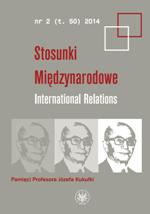Humanizacja pokoju i bezpieczeństwa międzynarodowego w działaniach Rady Bezpieczeństwa Narodów Zjednoczonych po "zimnej wojnie"
Humanization of International Peace and Security in Activities of the United Nations Security Council after the Cold War
Author(s): Irena Popiuk-RysińskaSubject(s): Politics / Political Sciences
Published by: Ústav mezinárodních vztahů
Keywords: Rada Bezpieczeństwa ONZ; międzynarodowy pokój i bezpieczeństwo; Karta Narodów Zjednoczonych; UN Security Council; international peace and security; UN Charter
Summary/Abstract: After the Cold War the UN Security Council shifted the focus from security of states to security of individuals and social groups which required protection during the armed confl ict and were subjects to brutalization. The Council broadens the defi nition of security, both in terms of a subject, as well as an object due to the discretionary powers specifi ed in the Charter of the United Nations. Humanization has also operational and normative dimension, since the Council, while developing instruments for the restoration and keeping international peace and security to a larger degree takes into account the human factor (e.g. targeted sanctions), as well as the normative factor because requirements to protect the population and the emerging responsibility to protect principle force reinterpretation of the principles of the UN Charter, including non-interference in internal affairs and the prohibition of the use of force.
Journal: Stosunki Międzynarodowe
- Issue Year: 50/2014
- Issue No: 2
- Page Range: 101-120
- Page Count: 20
- Language: Polish

